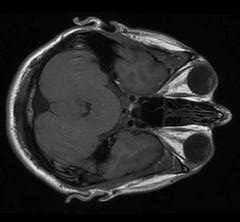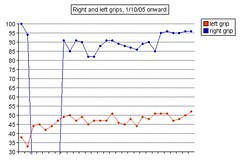P2: Glutamine and (gasp!) glutamic acid
Left grip is at a record 52 pounds (46, 49, 52), right grip ties the record of 96 pounds (95, 94, 96), and inhale is back up to 4600 mL, while left one-legged balance is at 6.73 seconds.
It rained yesterday afternoon and the roof patch appears to be working.
Our daughter woke us up around 4:30 a.m this morning and there has been no peace since. So this entry.
My neurologist said that I should avoid protein supplements that contain glutamine. The one I was taking has it. Glutamine, by it's very name, appears related to glutamate, and you will recall that when I was taking a protein powder that contained glutamate, I became so messed up that I didn't feel like walking.
Here's what I found in quick web search using the keywords 'glutamate glutamine toxicity'
This is an interesting primer on what the brain is doing with these compounds, but I cut it off after the key point, which indicates that glutamine CAN turn into glutamate:
"In order for the brain to use the common amino acid glutamate as a neurotransmitter, it has been necessary to introduce a series of innovations that greatly restrict the availability of glutamate, so that it cannot degrade the signal-to-noise ratio of glutamatergic neurons. The most far-reaching innovations have been: i) to exclude the brain from access to glutamate in the systemic circulation by the blood-brain barrier, thereby making the brain autonomous in the production and disposal of glutamate; ii) to surround glutamatergic synapses with glial cells and endow these cells with much more powerful glutamate uptake carriers than the neurons themselves, so that most released transmitter glutamate is rapidly inactivated by uptake in glial cells; iii) to restrict to glial cells a key enzyme (glutamine synthetase) that is involved in the return of accumulated glutamate to neurons by amidation to glutamine, which has no transmitter activity, and can be safely released to the extracellular space, returned to neurons and deaminated to glutamate..."
And this is from some commercial supplement company:
"Even though glutamine supplementation is indeed likely to raise glutamate levels in the brain..."
That's enough for me, and I'm willing to avoid glutamine. No more of that protein powder for me. I'll keep my weight up by using fats and carbohydrates.
Glutamic acid!!!
Oh man, this is worse than I thought! I response to Liz's comment, I looked at the ingredients on my protein powder. It does not contain glutamine, as I had thought. But it contains glutamic acid, 4990 mg per serving. Over a year ago when I was diagnosed, I recall seeing that and thinking "Sure sounds a lot like glutamate, but it's an acid, and I bet it's harmless, the way you still have the right to free speech at work."
But holy smokes, Batman, it's the same exact thing! And I've been poisoning myself with it since diagnosis!
From Wikipedia, the free encyclopedia:
Glutamic acid or glutamate is one of the 20 most common natural amino acids. As its name indicates, it is acidic, with a carboxylic acid component to its side chain.
Glutamic acid is critical for proper cell function, but it is not considered an essential nutrient in humans because the body can manufacture it from simpler compounds.
In addition to being one of the building blocks in protein synthesis, it is the most widespread neurotransmitter in brain function, as an excitatory neurotransmitter and as a precursor for the synthesis of GABA in GABAergic neurons. Glutamate activates both ionotropic and metabotropic glutamate receptors. The ionotropic ones being non-NMDA (AMPA and kainate) and NMDA receptors. Free glutamic acid cannot cross the blood-brain barrier in appreciable quantities; instead it is converted into L-glutamine, which the brain uses for fuel and protein synthesis.
It is conjectured that glutamate is involved in cognitive functions like learning and memory in the brain, though excessive amounts may cause neuronal damage associated in diseases like amyotrophic lateral sclerosis, lathyrism, and Alzheimer's disease. Also, the drug phencyclidine (more commonly known as PCP) both stimulates NMDA receptors and, in high enough doses, also causes behavior reminiscent of schizophrenia. However, this may be a total coincidence (especially since PCP trips are characterized by visual hallucinations, whereas schizophrenics more often hear voices).
The sodium salt of glutamic acid, monosodium glutamate (MSG) is responsible for one of the five basic tastes of the human sense of taste (umami), and MSG is extensively used as a food additive.
The way I read this, most of it did not get into my brain. Although I wonder, why did the whey protein powder that listed glutamate as an ingredient have me crawling on my back? Maybe I really did have the flu? I will never use a protein powder again! I've been staying away from MSG, and the rest of you should too.



<< Home